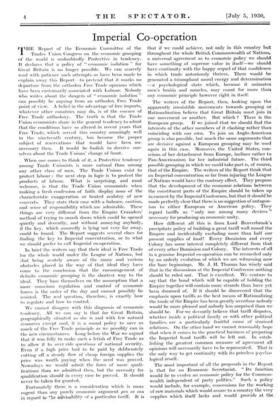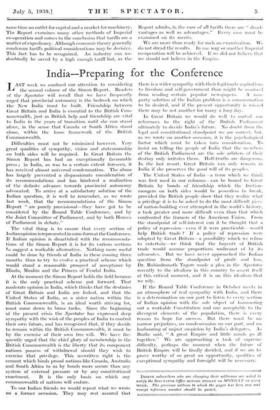Imperial Co-operation
V 1HE Report of the Economic Committee of the -I- Trades Union Congress on the economic grouping of the world is undoubtedly Protective in tendency. It declares that a policy of " economic isolation " for Great Britain is no longer possible. We can scarcely read with patience such attempts as have been made to explain away this Report—to pretend that it marks no departure from the orthodox Free Trade opinions which have been customarily associated with Labour. Nobody who writes about the dangers of " economic isolation " can possibly be arguing from an orthodox Free Trade point of view. A belief in the advantage of free imports, whatever other countries may do, is of the essence of Free Trade orthodoxy. The truth is that the Trade Union economists share in the general tendency to admit that the conditions have so altered in recent years that Free Trade, which served this country amazingly well in the nineteenth century, has become the proper subject of reservations that would have been un- necessary then. It would be foolish to deceive our- selves about the Trade Unions' change of front.
When one comes to think of it, a Protective tendency among Trade Unionists is more natural than among any other class of men. The Trade Unions exist to protect labour ; the next step in logic is to protect the products of labour. What is surprising, and most welcome, is that the Trade Union economists when making a fresh confession of faith display none of the characteristic exaggeration or heated zealotry of new converts. They state their ease with a balance, caution, and sense of responsibility which are admirable. These things are very different from the Empire Crusaders' method of trying to smash doors which could be opened quietly and decently, and without annoying anybody, if the key, which assuredly is lying not very far away, could be found. The Report suggests several clues for finding the key to Imperial concentration, or to what we should prefer to call Imperial co-operation.
In brief the writers say that their ideal is Free Trade for the whole world under the League of Nations, but that being acutely aware of the many and various obstacles placed in the way of that ideal they have come to the conclusion that the encouragement of definite economic grouping is the shortest way to the ideal. They base themselves on the assumption that a more conscious regulation and control of economic forces is the order of the day and cannot possibly be resisted. The real question, therefore, is exactly how to regulate and how to control.
We cannot disagree with this diagnosis of economic tendency. All we can say is that for Great Britain, geographically situated us she is and with few natural resources except coal, it is a sound policy to save as much of the Free Trade principle as we possibly can in the new circumstances. Long before the War we argued that it was folly to make such a fetish of Free Trade as to allow it to over ride questions of national security. Even if a high price had to be paid by deliberately cutting off a steady flow of cheap foreign supplies the price was worth paying when the need was proved. Nowadays we would admit the force of more quali- fications than we admitted then, but the necessity for qualification should in every case be proved. It should never be taken for granted.
Fortunately there is a consideration which is more cogent than any purely economic argument pro or con in regard to the advisability of a particular tariff. It is that if we could achieve, not only in this country but throughout the whole British Commonwealth of Nations, a universal agreement as to economic policy we should have something of supreme value in itself—we should have continuity with the happy sequel of that confidence in which trade notoriously thrives. There would be generated a triumphant moral energy and determination —a psychological state which, because it animates men's brains and muscles, may count for more than any economic principle however right in itself.
The writers of the Report, then, looking upon the apparently irresistible movements towards grouping or Rationalization believe that Great Britain must join in' one movement or another. But which ? There is the European group. If we joined that we should find the interests of the other members of it clashing rather than coinciding with our own. To join an Anglo-American group is also possible, but much the same arguments that are decisive against a European grouping may be used again in this case. Moreover, the United States, con- scious. of her detachment from Europe, inclines rather to Pan-Americanism for her industrial future. The third possible grouping in which we could take part is, of course, that of the Empire. The writers of the Report think that an Imperial concentration so far from injuring the League of Nations would have the contrary effect. They propose that the development of the economic relations between the constituent parts of the Empire should be taken up in earnest by the Imperial Conference, but that it should be made perfectly clear that there is no suggestion of antagon- ism to either European or American policy. They regard tariffs as " only one among many devices " necessary for producing an economic unity.
How different all this is from Lord Beaverbrook's precipitate policy of building a great tariff wall round the Empire and incidentally excluding more than half our present supplies of food ! Every Dominion and every Colony has some interest completely different from that of every other Dominion and Colony. The interests of all in a genuine Imperial co-operation can be reconciled only by an orderly evolution of which we are witnessing now the bare beginnings. Mr. J. H. Thomas has wisely said that in the discussions at the Imperial Conference nothing should be ruled out. That is excellent. We venture to say that the bond which will be capable of holding the Empire together will contain more strands than have yet been dreamed of. If it should be discovered that the emphasis upon tariffs as the best means of Rationalizing the trade of the Empire has been greatly overdone nobody would be more pleased and nobody less surprised than we should be. For we devoutly believe that tariff disputes, whether inside a political family or with other political families, are a particularly fruitful cause of strained relations. On the other hand we cannot reasonably hope that when it conies to the practical business of preparing the Imperial bond tariffs will be left out. In estab- lishing the greatest common measure of agreement all opinions will necessarily have to be represented. That is the only way to get continuity with its priceless psycho- logical result.
The most important of all the proposals in the Report is that for an Economic Secretariat. " Its function would be to evolve an economic policy for the Common- wealth independent of party politics." Such a policy would include, for example, concessions for the working of raw materials which would assure to a country the very supplies which itself lacks and would provide at the same time an outlet for capital and a market for machinery. The Report examines many other methods of Imperial co-operation and comes to the conclusion that tariffs are a matter of expediency. Although economic theory generally condemns tariffs political considerations may be decisive. This fact has to be recognized. An industry can un- doubtedly be saved by a high enough tariff but, as the Report admits, in the case of all tariffs there are " disad- vantages as well as advantages." Every case must be examined on its merits.
We are more than ready for such an examination. We do not dread the results. In one way or another Imperial co-operation will be achieved. If we did not believe that we should not believe in the Empire.











































 Previous page
Previous page